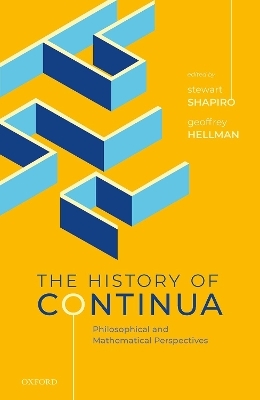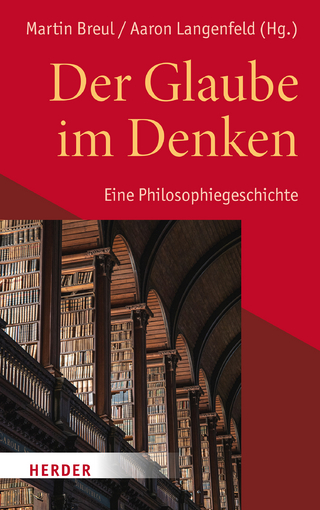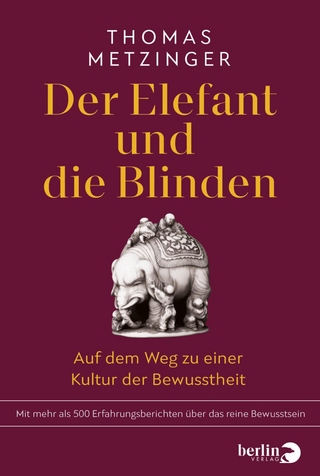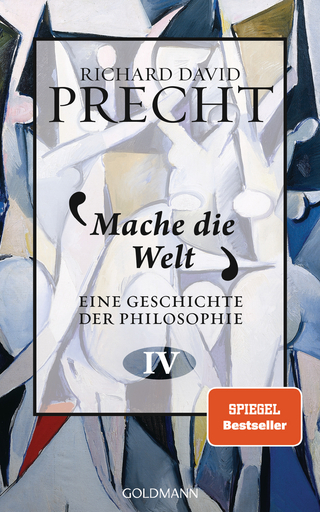
The History of Continua
Oxford University Press (Verlag)
978-0-19-880964-7 (ISBN)
Mathematical and philosophical thought about continuity has changed considerably over the ages. Aristotle insisted that continuous substances are not composed of points, and that they can only be divided into parts potentially. There is something viscous about the continuous. It is a unified whole. This is in stark contrast with the prevailing contemporary account, which takes a continuum to be composed of an uncountably infinite set of points. This vlume presents a collective study of key ideas and debates within this history.
The opening chapters focus on the ancient world, covering the pre-Socratics, Plato, Aristotle, and Alexander. The treatment of the medieval period focuses on a (relatively) recently discovered manuscript, by Bradwardine, and its relation to medieval views before, during, and after Bradwardine's time. In the so-called early modern period, mathematicians developed the calculus and, with that, the rise of infinitesimal techniques, thus transforming the notion of continuity. The main figures treated here include Galileo, Cavalieri, Leibniz, and Kant. In the early party of the nineteenth century, Bolzano was one of the first important mathematicians and philosophers to insist that continua are composed of points, and he made a heroic attempt to come to grips with the underlying issues concerning the infinite.
The two figures most responsible for the contemporary orthodoxy regarding continuity are Cantor and Dedekind. Each is treated in an article, investigating their precursors and influences in both mathematics and philosophy. A new chapter then provides a lucid analysis of the work of the mathematician Paul Du Bois-Reymond, to argue for a constructive account of continuity, in opposition to the dominant Dedekind-Cantor account. This leads to consideration of the contributions of Weyl, Brouwer, and Peirce, who once dubbed the notion of continuity "the master-key which . . . unlocks the arcana of philosophy". And we see that later in the twentieth century Whitehead presented a point-free, or gunky, account of continuity, showing how to recover points as a kind of "extensive abstraction". The final four chapters each focus on a more or less contemporary take on continuity that is outside the Dedekind-Cantor hegemony: a predicative approach, accounts that do not take continua to be composed of points, constructive approaches, and non-Archimedean accounts that make essential use of infinitesimals.
Stewart Shapiro received an M.A. in mathematics in 1975, and a Ph.D. in philosophy in 1978, both from the State University of New York at Buffalo. He is currently the O'Donnell Professor of Philosophy at The Ohio State University, and serves as Distinguished Visiting Professor at the University of Connecticut, and Presidential Fellow at the Hebrew University of Jerusalem. He has contributed to the philosophy of mathematics, philosophy of language, logic, and philosophy of logic. Geoffrey Hellman received his BA and PhD from Harvard (PhD 1973). He has published widely in philosophy of quantum mechanics and philosophy of mathematics, developing a modal-structural interpretation of mathematics. He has also worked on predicative foundations of arithmetic (with Solomon Feferman) and pluralism in mathematics (with John L. Bell). In 2007 he was elected to the American Academy of Arts and Sciences. He and Stewart Shapiro co-authored Varieties of Continua: from Regions to Points and Back (Oxford, 2018).
Introduction
1: Divisibility or indivisibility: the notion of continuity from the Presocratics to Aristotle, Barbara Sattler
2: Contiguity, continuity and continuous change: Alexander of Aphrodisias on Aristotle, Orna Harari
3: Infinity and continuity: Thomas Bradwardine and his contemporaries, Edith Dudley Sylla
4: Continuous extension and indivisibles in Galileo, Samuel Levey
5: The indivisibles of the continuum: seventeenth- century adventures in infinitesimal mathematics, Douglas. M Jesseph
6: The continuum, the infinitely small, and the law of conti- nuity in Leibniz, Samuel Levey
7: Continuity and intuition in 18th century analysis and in Kant, Daniel Sutherland
8: Bolzano on continuity, P. Rusnock
9: Cantor and continuity, Akihiro Kanamori
10: Dedekind on continuity, Emmylou Haner and Dirk Schlimm
11: What is a number?: continua, magnitudes, quantities, Charles McCarty
12: Continuity and intuitionism, Charles McCarty
13: The Peircean continuum, Francisco Vargas and Matthew E. Moore
14: Points as higher-order constructs: Whitehead's method of extensive abstraction, Achille C. Varzi
15: The predicative conception of the continuum, Peter Koellner
16: Point-free continuum, Giangiacomo Gerla
17: Intuitionistic/constructive accounts of the continuum today, John L. Bell
18: Contemporary innitesimalist theories of continua and their late 19th and early 20th century forerunners, Philip Ehrlich
| Erscheinungsdatum | 03.02.2021 |
|---|---|
| Verlagsort | Oxford |
| Sprache | englisch |
| Maße | 165 x 241 mm |
| Gewicht | 990 g |
| Themenwelt | Geisteswissenschaften ► Philosophie ► Geschichte der Philosophie |
| Geisteswissenschaften ► Philosophie ► Philosophie der Neuzeit | |
| Mathematik / Informatik ► Mathematik | |
| Naturwissenschaften | |
| ISBN-10 | 0-19-880964-6 / 0198809646 |
| ISBN-13 | 978-0-19-880964-7 / 9780198809647 |
| Zustand | Neuware |
| Haben Sie eine Frage zum Produkt? |
aus dem Bereich


